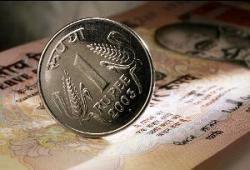 Costlier essential items like potatoes and pulses pushed up food inflation to 19.83 per cent in the third week of December after easing a bit in the previous week, belying hopes of any sustained relief for the common man.
Costlier essential items like potatoes and pulses pushed up food inflation to 19.83 per cent in the third week of December after easing a bit in the previous week, belying hopes of any sustained relief for the common man.
The wholesale-price based index of food articles rose by 1.18 per cent for the week ended December 19 from 18.65 per cent a week ago.
A week before that, food inflation stood at the decade's highest level of 19.95 per cent.
The rise in food prices is mainly due to dearer essential items like potatoes, onions, pulses etc.
Potato price more than doubled while pulses became costlier by over 41 per cent over the last year. Besides, onion rose by 40.75 per cent. In Kolkata, finance minister Pranab Mukherjee said farm production is likely to contract in the third quarter due to the poor monsoon.
If this happens, inflation may not ease substantially. However, he said there is no sign that excess money supply is leading to inflation.
But analysts say there is still a risk of high food prices and the RBI could take monetary tightening measures to moderate it.
The RBI will come out with its third quarter review of the monetary policy on January 29.
According to the Prime Minister's economic advisory panel, the overall inflation is likely to cross RBI's estimate of 6.5 per cent and it may have to take monetary action to tame it.
"By the end of March 2010, inflation could be close to seven per cent," Prime Minister's Economic Advisory Council chairman C Rangarajan said recently.
Besides potatoes, onions and pulses, rice rose by 12.95 per cent, wheat by 12.66 per cent, milk by 13.61 per cent and fruits by 10.35 per cent on a yearly basis.
Average food inflation so far stood at 12 per cent as on December 19, while inflation of primary articles (non-processed items), including food, stood at 15.49 per cent.
Prices of fuel, power, light and lubricants rose at a rate of 4.45 per cent during the week ended December 19 from 3.94 a week ago.
This is despite the fact that LPG prices declined by 7.42 per cent, petrol by 2.18 per cent and high speed diesel oil by 0.19 per cent.
There is still the risk of firm food prices and the RBI is likely to take some measures in the quarterly monetary review to moderate it.
However, since any hike in interest rates might hurt the fragile recovery process, the apex bank may directly attack money supply.
"I expect hike in cash reserve ratio by 50 basis points on January 29," HDFC Bank economist Jyotinder Kaur said. With excess liquidity in the system, hike in the CRR, which is the requirement for banks to keep cash with the central bank, might not lead to interest rate rise.
In fact, SBI chairman OP Bhatt recently said the situation of surplus liquidity will force banks not to increase interest rates.









 © 2025
© 2025